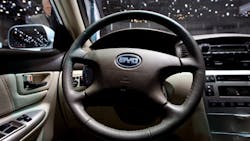BYD Co. showed off its latest compact SUV model in a lights-and-dance show in Beijing on Monday, as China’s largest electric-car maker seeks to replicate Tesla Motors Inc.-like buzz to compete in a crowded market.
The Yuan, named after the 13th-century Chinese dynasty established by the conquering Mongols, starts from 59,900 yuan ($9,262) for the gasoline-engine version. Its arrival, timed ahead of the Beijing motor show later this month, marks BYD’s entrance into the entry-level sport utility vehicle segment popular with young urban families and single professionals.
The automaker, perhaps best known globally for winning an investment by Warren Buffett’s Berkshire Hathaway Inc., has made branding its top priority for the next two to three years, BYD’s senior vice president Stella Li said in an interview. While likening BYD chairman Wang Chuanfu to a marathon runner and Tesla CEO Elon Musk to a sprinter, she acknowledged BYD’s inability to draw lines of consumers out the doors of retail outlets clamoring for its cars.
“We don’t have the ability now to sell tens of thousands of cars before producing a single one,” Li said, referring to the reservations consumers have placed for Tesla’s Model 3 this month. “The day we can do that will be the day our brand is established.”
By naming its models after different Chinese reigns as part of a Dynasties line, BYD is setting itself apart from other automakers that use letters and numbers to denote their lineup — think Audi’s A6, BMW’s 3 Series and Mercedes-Benz’s S-Class. At the same time, BYD risks creating a brand identity so tied to Chinese culture that it resonates less in overseas markets.
Chinese carmakers, like the Korean and Japanese brands before them, are struggling to upgrade their image and move beyond reputations for making cheap, utilitarian vehicles sometimes accused of ripping off more established competitors. For BYD, a mass-market image hampers the company’s ability to charge a premium and differentiate its brand.
As China’s biggest maker of electric vehicles, BYD is vulnerable to being squeezed out of the top end of the market by companies such as Tesla, with its cult-like appeal that consumers pay a premium for. At the low end, dozens of small-time manufacturers are competing on price.
A host of companies, many without auto-making experience, also have staked a claim to creating connected electric vehicles as the government has encouraged technology companies to help upgrade the traditional auto industry.
“With the increasing size of the new-energy vehicle pie, many players are coming in and the industry will enter a period of reshuffle,” chairman Wang said. “We are thinking about what we should do going forward every single day.”
Tesla’s popularity and China’s expanding set of electric-car competitors are putting pressure on BYD, said Steve Man, a Hong Kong-based analyst covering the auto industry at Bloomberg Intelligence: “Elon Musk’s recognizable fame and success as an entrepreneur makes him a strong voice for Tesla,” he said. “BYD will probably need to build a greater awareness to maintain its market share.”
Tesla’s shares have gained 19% in the past year, while BYD’s have slumped 15% in Hong Kong trading. Gary Tao, Tesla’s Beijing-based spokesman, didn’t comment on Li’s remarks about Tesla.
“What BYD hopes to achieve through its brand image is to position us as a company that’s grounded, that will deliver what we promise and one with a long-term target,” Li said. “We don’t seek a moment’s glory or satisfaction, but take a long-term view. BYD hopes to create a business that’ll be around for a hundred years.”
While BYD is selecting a consulting firm to advise on its branding makeover, subtle changes already emerged during the Monday event in Beijing. Instead of delivering his speech behind a lectern, as he did last year during an inaugural BYD fan event in Shenzhen, Wang roamed the stage in a Steve Jobs-style presentation. He laid out the company’s vision and its responsibility to make the air cleaner and roads safer to the hundreds of gathered fans and media, eschewing use of technical terms to describe the company’s technology.
“We are lucky to grab the rare opportunity in a hundred years when demand for electric vehicles picks up,” Wang said, flanked by the company’s cars. “We have to shoulder our responsibilities to make a change and benefit our children.”
In related news, China new car sales jumped 8.8% in March from the same point in 2015, with total vehicle sales hitting 2.44 million in the month.
By Tian Ying
About the Author
Bloomberg
Licensed content from Bloomberg, copyright 2016.
